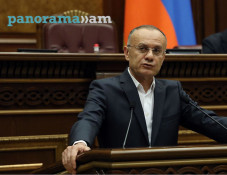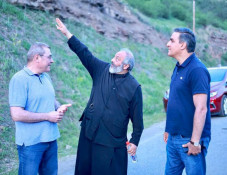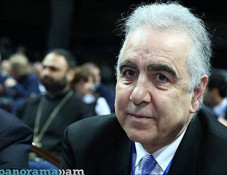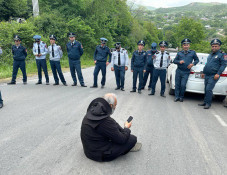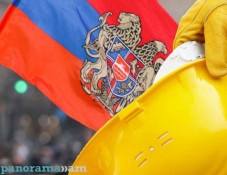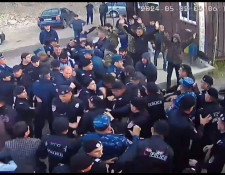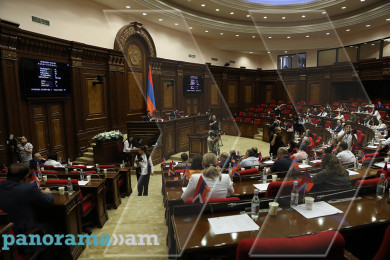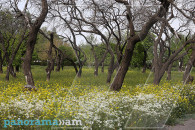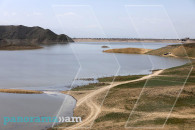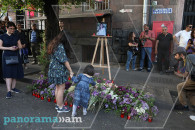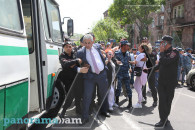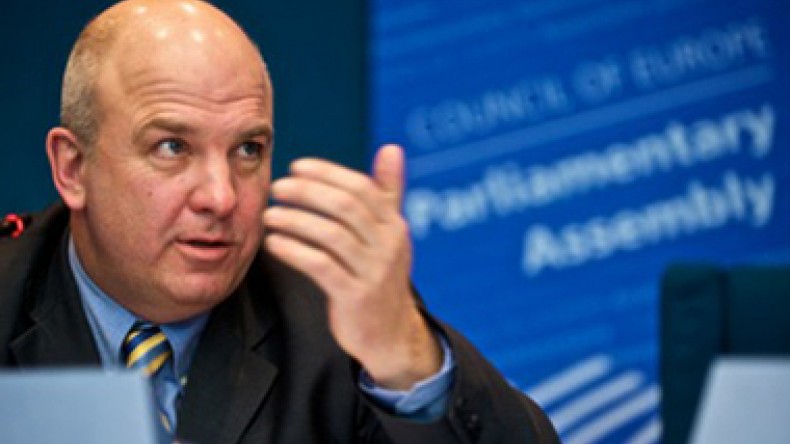
CoE Commissioner for Human Rights: Deportation and massacre of Armenians was massive violation of human rights
Nils Muižnieks, Council of Europe Commissioner for Human Rights, reflected on the Armenian Genocide, Armenian-Turkish relations and human rights in his article titled “Armenian-Turkish Reconnections and Human Rights,” published on the Council of Europe’s official website.
The full article is provided below.
“History continues to divide Armenian and Turkish officialdom, but there are many civil society, cultural and academic initiatives aiming to reconnect the two societies. April 24 marks the centennial of the beginning of the mass killings, deportations and dispossession of Armenians in the Ottoman Empire in 1915, which resulted in the near-total elimination of Armenians from Anatolia. These massive human rights violations and their painful legacy left a major rift between two societies, which has crystallised around the issue of their political and legal designation as genocide. However, it is heartening to see that today many people are seeking to overcome this difficult legacy and to promote mutual understanding, reconciliation and the reconstruction of a shared history, demonstrating a true human rights ethos.
The Emergence of a Thaw
Discussion in Turkey of what was sometimes euphemistically called the “1915 Events” was long taboo or even subject to criminal prosecution under the offense of “insulting Turkishness”. In recent years, prosecutions under this article have become more infrequent and a space for discussion has emerged. This space has been created by a number of concurrent developments, particularly increased contacts between Turks and Armenians and domestic Turkish political and cultural evolution.
Though the land border remains closed, nationals of both countries have enjoyed relatively free travel to the neighbouring country. As a result, the number of Armenian nationals entering Turkey increased from less than 5,500 in 2000 to more than 73,000 in 2013. In 2011 the Turkish authorities even granted special permission for migrant children of Armenian nationality to attend the schools of the Turkish Armenian minority. While many Armenians seek informal work in the Turkish economy, others (from both Armenia and the diaspora) have increasingly travelled to Turkey to reconnect with their roots by visiting their ancestors’ places of origin and the descendants of family members who stayed during and after World War I.
At the same time, the debate within Turkey about the past has evolved considerably. While an academic conference in Istanbul was a watershed in 2005, since then, a plethora of scholarly work about the Armenian legacy in Turkey has been published. A turning point in the Turkish debate appeared to come with the tragic assassination of Turkish-Armenian journalist Hrant Dink in 2007, which led to further calls for a reassessment of the past, more open public discussion and a more compassionate tone of discourse. In a sign of this new tone, intellectuals in Turkey organised a petition campaign in 2008, in which thousands signed an apology to Armenians for the “Great Catastrophe”.
Recent Civil Society Initiatives
In recent years, a host of civil society initiatives have been implemented, suggesting that people-to-people diplomacy has far outstripped official relations, which remain deadlocked. Starting in 2009, the Hrant Dink Foundation in Turkey began to organise journalistic exchanges to foster better coverage of issues affecting the neighbouring country. On the Armenian side, early initiatives sought to document, acknowledge and publicise the role of “righteous Turks” who saved the lives of Armenians.
In early 2014 a consortium of 8 NGOs from Turkey and Armenia launched a programme entitled “Support to the Armenia-Turkey normalisation process” with support from the European Union. The programme includes exchanges and study visits of journalists, artists and environmental activists, summer schools for teachers, oral history projects, exhibitions, support for a joint Turkish-Armenian youth orchestra, and academic talks. The private sector is also seeking to foster business ties, which now take place primarily in a circuitous manner via Georgia or Iran, and to promote bilateral economic partnerships.
These are encouraging steps which, if continued, could form the basis for effectively dealing with a painful past and addressing the legacy of 1915. They have already contributed to an evolution within Turkish society, from opposing the suffering of the ancestors of the majority population during the fall of the Ottoman Empire against that of the Armenians, towards an acknowledgement of the suffering of the other side and its integration into the collective consciousness. Dealing with the past requires empathy and mutual understanding, and these initiatives are precisely furthering that aim. This could then in turn serve as a basis for an evolution of the position of the national authorities. The latter should refrain from impeding or seeking to gain political advantage from such initiatives and seek to support those actors aiming at seeking the truth and fostering contacts and understanding.
A Human Rights Framework?
The deportation and massacre of Armenians by the Ottoman authorities was a massive violation of human rights. The first rule of international human rights might be summarised as “no impunity for perpetrators.” However, since the tragedy took place 100 years ago, the perpetrators are no longer among the living and cannot be held to account. One indicator of progress in dealing with the past in Turkey will be the evolution of the official stance towards these past human rights violations. By official stance, I mean not only political statements by Turkey’s leaders, but also the institutional stance as reflected notably in officially approved school history textbooks, state-funded museum exhibitions and other cultural output. Are perpetrators condemned and crimes acknowledged? Or are they ignored, downplayed, justified, or even glorified?
A second element of a human rights approach might be summarised as “address the needs of victims and their families.” While few survivors are still with us after 100 years, many of their descendants also suffered from what happened. A human rights approach foresees various ways to provide redress and reparation to victims of human rights violations. One of these ways is the recognition of the tragedy through commemorative dates, rituals and monuments. There have been instances where property was returned to Armenians in Turkey and some parts of the Armenian cultural heritage in Turkey have been rehabilitated, such as the Surp Giragos church in Diyarbakir and the Surp Khach church on Akdamar Island. The significance of these initiatives, including for Turkish society, should not be underestimated. Recently, the Van municipal council also restored Armenian (and Kurdish) toponyms. However, much more could be done in this area.
Commemorations and Solidarity
In Armenia, the centennial will be marked on April 24 with solemn ceremonies and a major international conference on genocide. Twice during recent visits I paid homage to the victims at the Armenian Genocide Memorial Monument in Yerevan. As the centennial approaches, my thoughts and solidarity are again with the victims and their descendants, but also with the civil society activists, scholars, journalists and artists from both Armenia and Turkey who are seeking to promote mutual understanding and foster an honest reckoning with a heavy historical legacy.”
Newsfeed
Videos






